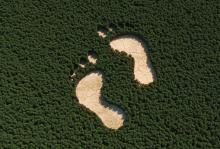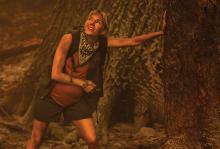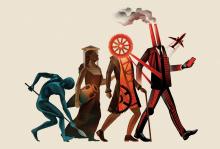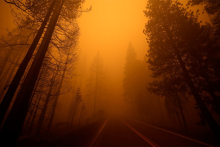climate catastrophe

On Nov. 19, Federal Emergency Management Agency Administrator Deanne Criswell sat before legislators on Capitol Hill and defended the agency from accusations that it responded slowly to hurricanes in the southeastern United States and skipped homes with President-elect Donald Trump signs on their property.
Earlier in November, Criswell said in a statement that a FEMA employee who had told relief workers in Florida to skip houses with signs supporting Trump had been fired. (Other employees later returned to those homes to offer the opportunity to apply for aid, Criswell testified.) This revelation came at a time when conspiracy theories about hurricanes were rampant.

IN COLOMBIA, the highest rainfalls in 40 years had reduced coffee production by nearly one-third at the end of 2022. In the United States, tornado deaths for the first quarter of 2023 were already nearing the annual average. In Jakarta, Indonesia, the government barrels forward with constructing a 29-mile sea wall to protect the city, which is sinking under rising sea levels.
Everywhere, the planet is changing. Land once known for certain weather patterns, flora, and fauna is becoming strange and unfamiliar. Ways of life forged from old patterns are crumbling. Communities scramble to find new ways to farm, fish, graze, and live in what increasingly feels like uncharted territory.
Many have taken up the language of grief and loss to guide us through this turbulent era. Australian philosopher Glenn Albrecht even coined the term “solastalgia,” which describes “the homesickness you have when you are still at home.” We long for the forests and meadows of our childhoods, alive with spring peepers and monarch butterflies, which today seem diminished or have completely disappeared, paved over by strip malls and subdivisions. The land that shaped us is still there, but it’s not the same.

New Earth?
The TV show Extrapolations, featuring Meryl Streep and Forest Whitaker, offers eight terrifying visions of how climate-changed humanity’s unchecked consumption will harm Earth. The interwoven stories aim to inspire climate action, even as they disturb.
Apple TV+

PHILIP JENKINS’ REMARKABLE Climate, Catastrophe, and Faith: How Changes in Climate Drive Religious Upheaval leads off with Voltaire: “Three things exercise a constant influence over the minds of [humankind] — climate, government, and religion ... That is the only way of explaining the enigma of this world.”
Climate and geology are now the new prisms for our shared discernment of how we are to live in our own time and place as followers of Christ. We’re driven to centering climate because we can no longer live with the expectation of the balanced climate of the last 12,000 years, the geologic epoch called the late Holocene. We are now in a new geologic epoch: the Age of the Human, or the Anthropocene.
Anthropocene reality leaves Christian ethics nowhere to hide. Nowhere to hide because unprecedented cumulative human powers doubled down on planet-spanning changes that launched the first geological epoch created by human choice and action. The fact that human choice and action has done this means that everything, including extinction, turns on ethics. As Christians, we can look away and abdicate our responsibility, but we cannot escape the massive human presence that lines out our lives — and all life. We’ve become totalizing creatures. We humans are, for the first time, both ark and flood.
This extraordinary power has been recognized for a while. In 1944, Dietrich Bonhoeffer wrote that the unprecedented powers of modern science and technology led to a world in which “it all comes down to the human being,” a world where “everything turns upon humanity.” He thus set out to reconceive human responsibility for a world that had come of age. For Bonhoeffer, “world come of age” was not a statement of moral maturity. It was a statement of moral accountability. People who legally come of age at 18 or 21 are accountable, whether they exercise their agency maturely or not. When everything turns on humanity, Bonhoeffer said, the whole human world has arrived at that point of accountability.
A current term for human powers and their collective impact is “assisted evolution.” But the phrase is deceptive because it hides the depth, breadth, and temporal reach of those powers. Does the phrase “assisted evolution” reveal that the carbon people produce has the ability to alter marine chemistry, flood coastlines, strip glaciers “to bare bones,” embolden deserts, warp the circulation of ocean currents, “supercharge extreme weather events,” and rearrange “the distribution of animal, plant, and microbial species across the globe,” as author David Farrier puts it? This isn’t evolution “assisted”; it’s evolution hacked and hijacked.

The United Nations panel on climate change told the world on Monday that global warming was dangerously close to being out of control – and that humans were “unequivocally” to blame.
Already, greenhouse gas levels in the atmosphere are high enough to guarantee climate disruption for decades if not centuries, the report from the scientists of the Intergovernmental Panel on Climate Change warned.
The earth dries up and withers ... The earth is defiled by its people; they have disobeyed the laws, violated the statutes, and broken the everlasting covenant. - Isaiah 24:4-6
Today I have given you the choice between life and death, between blessings and curses. Now I call on heaven and earth to witness the choice you make. Oh, that you would choose life, so that you and your descendants might live! - Deuteronomy 30:19
During the 1980s, many Christians were at the forefront of a movement to avert nuclear annihilation. They saw this transcendent threat as a moral crisis and felt a responsibility to nonviolently resist, including acts of civil disobedience and divine obedience. Today, we face a comparable danger -- a climate catastrophe which could decimate life on earth. Yet it seems not to have been picked up on the Christian "radar screen" in the same way. For this reason, it is actually more insidious.